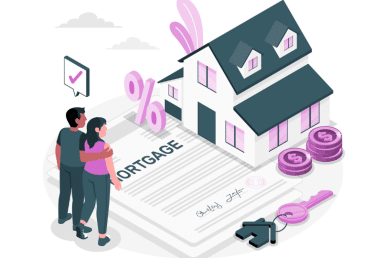Shopping for a Mortgage
Shopping around for a mortgage takes time and energy. But it can save you thousands of dollars. Make it your goal to compare at least three loan offers from different lenders.
Get at least three preapprovals
The Internet and newspapers are a good place to start your search for mortgage lenders. Find a Mortgage Lender.
Contact banks, credit unions, and organizations that might specialize in your situation—like first-time homebuyers, veterans, public service workers, or others.
Ask at least three different lenders for “preapproval.”
This means that the lender looks at your finances, including your credit report, and estimates how much you can borrow and what interest you’ll likely pay.
Preapproval lets you try out each lender to see what kind of loans and prices they offer.
When you get all three preapprovals within a short time, there should be no major impact on your credit score.
You’ll come back to these lenders when you’ve made some decisions and ask them for loan offers.
Find a Mortgage Lender
Start your search for mortgage lenders
Shop for loan terms, interest rate structures, and programs
Loan term: Longer or shorter
In general, a longer loan term costs more over the life of the loan. But your monthly payments are typically lower.
You may be able to negotiate a different loan term with your lender, like 20 years, 7 years, or even longer than 30 years.
30-year
Most homebuyers choose a 30-year loan because payments can be low.
15-year
Payments are typically higher than for 30-year loans, but your loan is paid off in 15 years and the total cost of the loan can be lower.
Loan interest rate structure: fixed rate or adjustable rate
Fixed-rate loans are common. Your initial payment may be lower with an adjustable-rate loan, but if interest rates rise, you might face sharply increased payments.
Fixed-rate mortgage
Your interest rate and monthly payment will stay the same for the life of your loan.
Adjustable-rate mortgage (ARM)
Your interest rate typically is fixed for the first few years of the loan. Once the fixed period expires, the rate adjusts at regular intervals based on an “index.”
An index is a measure of interest rates generally, and it reflects trends in the overall economy. This means your payment amount can increase or decrease. Details are included in the Loan Estimate you receive from the lender.
Loan program: Conventional, FHA, VA, or special program
There are many loan programs, and some are set up to help make mortgages available to people in certain circumstances or groups.
Making a down payment of 5% or more?
Ask about a Fannie Mae or Freddie Mac eligible loan, often called a “conventional” loan.
Making only a small down payment?
Ask about an FHA-insured loan.
Service member or veteran?
Ask about a VA guaranteed loan.
Buying a home in a rural area?
Ask about a USDA-sponsored loan.
First-time homebuyer with low or moderate income?
Ask about loans available through your state’s housing finance agency.
Compare loan offers
Now, it’s time to start the official application process. Ask your lenders for offers of loans that reflect your choices for loan type, program, and term. Then you’ll be able to make apples-to-apples comparisons.
First, compare the basic parts of the loan:
• What is the term of the loan?
• What is the interest rate?
• What down payment amount is the loan based on?
• How much is the monthly payment?
• For adjustable-rate mortgages, are the payment adjustments and the interest rate capped?
• Does the interest rate go down if market interest rates fall?
• Ask about “One-Time Loans” with one closing.
Next, compare the rest of the details that can affect your cost:
• When will my payments pay off my principal?
• Will the payments change over the life of the loan? How high can my payment go?
• Does my payment include property taxes and insurance? If not, can I afford to pay those separately?
• What costs and fees will be added to my initial payment? To my ongoing payment?
• Do I need to pay points (upfront fees that reduce your interest rate)?
• What fees and costs are included in the amount I’m borrowing (typical for a “no closing cost” loan)?
• Does the written offer match what I was told about the loan?
• Can I get a better deal on settlement services from different service providers?
• Can I repay the loan early, or make larger than scheduled payments, without penalty?
Ask for a better deal
Once you see the offers from several lenders, ask if they can do better.
Negotiation is common, and there’s no harm in asking.
The lender may be able to waive or reduce one or more of the fees, or lower the interest rate or points.
Make sure the lender doesn’t lower one fee while raising another, or lower your interest rate but raise your points.
Learn more at www.consumerfinance.gov. Information courtesy of Consumer Finance Protection Bureau
Find a Mortgage Lender
Start your search for mortgage lenders
© RGV New Homes Guide, 2022. Unauthorized use and/or duplication of this material without express and written permission from this site’s author and/or owner is strictly prohibited. Excerpts and links may be used, provided that full and clear credit is given to RGV New Homes Guide with appropriate and specific direction to the original content.





